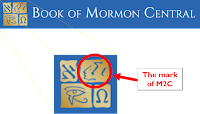There has been a lot of discussion about my comments regarding the Gospel Topics Essays. My position is simply and clear.
The Gospel Topics Essays are useful resources that point to reliable sources. They have not been canonized. They have been revised in the past and can be revised and improved at any moment. I point out errors and omissions in the essays because I’m hopeful that the essays will continue to be improved, particularly by including the relevant and reliable sources from the Joseph Smith Papers that have so far been omitted.
_____
I encourage people to read the essays partly because the introduction to those essays expresses my objection to the M2C/SITH citation cartel.
The introduction to the essays quotes D&C 88:118 and explains that “Seeking “out of the best books” does not mean seeking only one set of opinions, but it does require us to distinguish between reliable sources and unreliable sources.”
Contrary to that guidance, the citation cartel (the Interpreter, Book of Mormon Central, FAIRLDS, Meridian Magazine, and all their followers) insist on “only one set of opinions” regarding M2C and SITH.
The Interpreter Foundation’s very name reflects its arrogant assumption of authority as the “interpreter” for ordinary Latter-day Saints. Typical of the credentialed class, they claim superiority over the rest of us who lack their credentials and status because they think we are incapable of understanding the gospel without their “interpretations” which they enforce through their journal, radio show, and even their movie Witnesses.
Book of Mormon Central is so adamant that only one set of opinions is permissible that they’ve embedded M2C right in their logo.
It’s the same logo that FARMS (which has promoted M2C for decades now) used before the principals left to form the Interpreter Foundation and Book of Mormon Central.
If the intellectuals in the citation cartel heeded the guidance from the Gospel Topics Essays, there wouldn’t be a citation cartel.
They would be open to alternative “interpretations” of the scriptures, the teachings of the prophets, and authentic historical documents–including an interpretation that corroborates and supports those teachings, instead of M2C/SITH which expressly repudiate those teachings.
_____
To be clear, I agree with, embrace, and do not dispute, what Elder Ballard said about the essays being important. I encourage people to read and study the essays because they contain useful references to reliable sources.
But nowhere have Church leaders stated, suggested, or implied that these essays were ever intended to replace the scriptures, the teachings of the prophets, or authentic historical documents.
Nevertheless, some people (including my critics) refer to the essays as though they have been canonized.
The introduction to the Gospel Topics Essays is here:
The introduction also says, “The Church places great emphasis on knowledge and on the importance of being well informed about Church history, doctrine, and practices.”
That, too, perfectly expresses my approach to Church history, doctrine and practices. I encourage people to be well informed so they can make informed decisions. As President Nelson has said, “Good inspiration is based upon good information.”
My objection to the citation cartel is not that they promote different interpretations than I do. That’s fine with me. I fully endorse the concept of multiple working hypotheses. My problem with the cartel is the same as my problem with the critics such as CES Letter and Mormon Stories; both groups deprive people of good information through censorship and sophistry purely to promote their respective agendas.
_____
To repeat: the Gospel Topics Essays have been revised in the past and can be revised and improved at any moment.
I point out errors and omissions in the essays because I’m hopeful that the essays will continue to be improved, particularly by including the reliable sources from the Joseph Smith Papers that have so far been omitted.
Source: Book of Mormon Concensus


